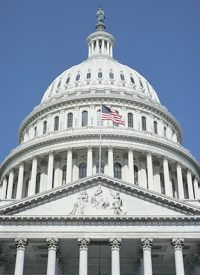
The votes on the tax cut bills were apparently symbolic ones so that politicians from both parties can laud their own efforts and lambaste their opponents in the upcoming 2012 election.
The Democratic plan would have both extended and expanded the payroll tax cut, reducing the Social Security payroll tax to 3.1 percent, even further than the present tax cut that is due to expire, but Republicans opposed the plan because it required a new tax to be imposed on the "wealthy" in order to cover the $110 billion in lost revenues.
The Democratic measure lost by a vote of 51 to 49. As observed by the Christian Science Monitor, “For the first time, a Republican, Susan Collins of Maine, voted to support the millionaires’ surcharge.”
Still, Democrats and President Obama took the opportunity to accuse the Republicans of attempting to raise taxes on the middle class.
President Barack Obama said in a statement, “It makes absolutely no sense to raise taxes on the middle class at a time when so many are still trying to get back on their feet.”
Proponents of the tax cuts do not wish to see the payroll tax expire because of the impact that expiration would have on economic growth. Reuters reports, “The White House, investment banks and some economists have warned in recent days that U.S. economic growth could suffer in 2012 if the tax cut for workers is allowed to expire.”
Following the vote on the Democratic plan, the Senate moved to a vote on the Republicans’ alternative plan, which would have also extended the tax cut for a year, but did not reduce the tax further, as the Democratic plan did. Most Republicans voted against the Republican alternative, as the measure was defeated in a 78 to 20 vote.
The revenues generated by the payroll tax cut is used to pay for Social Security retirement benefits, but Democrats have touted the payroll tax cut as a means to put money back into workers’ hands.
Debate over the payroll tax cut has caused some disorder within the Republican Party, as the top Republican in the U.S. House of Representatives, House Speaker John Boehner, made a declaration that put him at odds with his party. According to Boehner, maintaining the payroll tax cut would help boost the economy, but some other members of the GOP are skeptical of such an assertion.
Boehner’s sentiments toward the payroll cut fluctuated a bit. He first said, “I’m not an economists, I don’t know what kind of impact it’s going to have,” regarding the potential benefits of the extended payroll tax cut on the economy. Just minutes later, however, he said, “I don’t think there is any question that the payroll tax relief, in fact, helps the economy, in allowing more Americans … to keep more of their money.”
The White House immediately seized upon Boehner’s comments. Members of Boehner's party were a bit perturbed by his stance against his own party’s assertions. Senate Republicans are insisting that tax cuts be paid for so as not to add to the $15 trillion deficit.
Democrats contend that their tax cut was in fact paid for by increasing taxes on the wealthy, but Republicans assert that the Democrats' new taxwould have hurt business owners who are the job creators.
Republicans instead wanted to cover the cost of extending the payroll tax cut by maintaining the current pay freeze for federal workers through 2015 and reducing the federal workforce by 10 percent.
Many Republicans, as well as some Democrats, believe that the payroll tax cut is not worth the cost, asserting that the tax cut has not increased job growth and has resulted in the borrowing more money.
"I can't find many people who even know that they're getting it, OK?" said Sen. Joe Manchin D-W.Va.), who opposed both plans. "So with that being said, we're going to double down on something that we thought should have worked that didn't work."
Republicans, though not sold on extending the payroll tax cut, are feeling the pressure to extend it as we move toward 2012, a presidential election year. “Republicans have finally felt the heat of doing something about the payroll tax cut,” said House Democratic Leader Nancy Pelosi.
Without a compromise, the payroll tax cut will be expire on December 31, resulting in an increase on payroll tax from 4.2 percent to 6.2 percent. The increase is expected to cost American families an average of approximately $1,000 a year.
Reuters predicts that a compromise bill will include elements of both the Democratic and Republican plan, as well as some other items to sweeten the deal:
A compromise bill likely would incorporate some Republican ideas for offsetting the revenue losses. For their part, Democrats might seek to include an extension of unemployment benefits that will begin to expire early next year, as well as a temporary patch for an upcoming problem with Medicare doctor payments.
Meanwhile, House Republicans are already working on a proposal that would extend unemployment benefits, as well as the payroll cut, but whether those extensions will appear in a single bill or in separate ones remains unclear.




